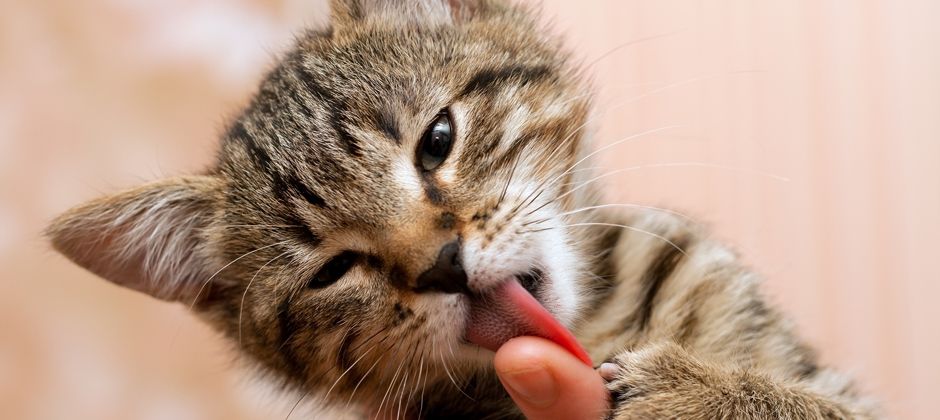Have you ever found yourself in a cozy moment, perhaps lounging on the couch, only to be interrupted by the gentle yet surprising sensation of your beloved cat licking your arm? It can be a delightful, perplexing experience. Why do cats lick you? Is this behavior simply an expression of affection, or is it a more complex form of communication? In this urgent exploration, we will delve deep into the multi-dimensional reasons behind this peculiar habit, offering insights that may transform the way you view your feline friend!
The Intriguing Language of Cats
First, it’s essential to understand that cat behavior can often seem enigmatic to us humans. Unlike dogs, who may exhibit more overt displays of affection through tail wagging or jumping around, cats are masters of subtlety. A lick from a cat can mean so much more than just a random act; it’s an intricate part of their communication and bonding process. Let’s explore these meanings in detail.
1. A Sign of Affection
At the forefront of the reasons why cats lick you is affection. When a cat licks you, it is often an innate expression of their love and comfort. Cats engage in a behavior known as allogrooming, where they groom each other as a sign of social bonding. This behavior is not only reserved for cats but has been seen in various species that exhibit social grooming as a component of their relationships.
When your cat licks you, they are essentially saying, “You are part of my family.” This form of grooming is an indication that your cat trusts you and feels safe around you. Whether you’re snuggling on the couch or lying peacefully in bed, that lick is their way of solidifying the bond you share. In a world where animals often rely on instinct, this grooming behavior serves as a bridge of connection between species—it's a sign that they hold you in high esteem.
2. Instincts Rooted in Kittenhood
To grasp the full spectrum of why cats lick you, we can't overlook the fact that this behavior is deeply rooted in their early life stages. Kittens instinctively lick their mothers not just to nurse but also to seek comfort and security. When your cat licks you, it can hark back to those formative moments when they relied on their mother for warmth and care. Licking you can be a nostalgic gesture, evoking those feelings of safety and affection they experienced as tiny kittens.
3. Grooming: A Form of Social Bonding
Grooming behaviors in cats are critical for social bonding and communication. In the wild or even in a multi-cat household, you will often observe cats grooming one another as a way to strengthen their social ties. Therefore, when your beloved kitty licks you, think of it as an invitation into their inner circle. They are essentially saying, “You belong to me, and I want to take care of you!” This mutual grooming strengthens friendships among cats and can be equally meaningful when directed towards humans.
Territory and Scent Marking
Have you ever considered that a simple lick could also be a way for your cat to communicate their territory? Yes, that’s right! When cats lick, they are engaging in a form of scent marking. Cats have scent glands in their tongues, and by licking you, they can deposit their unique scent. This behavior serves a dual purpose: it not only signifies affection but also claims you as part of their domain.
4. Marking Their Territory
The Complex Communication of Cats
Now that we’ve dived into the affectionate and instinctual reasons behind why cats lick you, let’s explore how licking can also be a means of communication that transcends simple affection.
5. A Call for Attention
Have you experienced your cat licking you persistently when you're busy? If so, your feline may be trying to get your attention. Cats are intelligent creatures and are quite adept at understanding how to engage their human counterparts. The act of licking can serve as a gentle reminder, an invitation for interaction, whether it's playtime, cuddles, or simply a moment of mutual relaxation.
When you notice your cat licking you, it could signify that they feel neglected or that they crave quality time with you. If you’re busy working on a project or scrolling through your phone, that lick might be their way of saying, “Hey, remember me? I need some love too!”
6. A Soothing Behavior: Stress Relief
Among the myriad reasons behind why cats lick you, some may be more related to their emotional states. Much like humans may engage in self-soothing behaviors to cope with stress or anxiety, cats can also lick themselves or their humans as a way to find comfort. If your cat has been acting anxious, you might find them licking you as a means of seeking reassurance.
This calming behavior becomes particularly critical in stressful environments. Sudden changes in the household—like moving to a new home, introducing new pets, or even alterations in human routines—can evoke anxiety in felines. In such scenarios, if your cat is excessively licking you, it’s worth paying attention to their emotional needs. They may be looking for comfort in you to help alleviate their anxiety.
Health Implications of Licking Behavior
While licking is generally a benign behavior, it’s important to be aware that excessive licking can indicate underlying health issues. If you notice that your cat is licking obsessively or if it transitions into more aggressive grooming behaviors, it’s crucial to consult a veterinarian.
7. Allergies and Skin Conditions
Chronic licking can be a symptom of allergies or skin irritations. If you observe your cat licking excessively or if it seems to be causing injury to their skin, seek professional advice. Cats can be susceptible to various allergens, from pollutants in the environment to specific food ingredients. Identifying and addressing these issues quickly is vital for your cat’s overall health and quality of life.
8. Stress and Anxiety Disorders
As mentioned earlier, some cats may develop compulsive behaviors—including excessive licking—as a response to stress or anxiety. If your pet is facing changes in their environment, such as moving houses, new pets joining the family, or even changes in your routine, these stressors could manifest in licking behaviors that require your attention. Take action by speaking to your vet about ways to alleviate your cat's stress. Solutions could include behavioral therapy, calming products, or even lifestyle changes in your home.
How to Respond to Your Cat's Licking
If your cat is licking you, it’s essential to understand how to respond appropriately to this intimate behavior. Here are some tips:
9. Create a Comfortable Environment
Since licking can be a form of seeking comfort or reassurance, establish a safe and cozy environment for your cat. Provide them with ample cozy spots, engaging toys, and a peaceful atmosphere. A calm environment can help alleviate anxiety-driven licking, promoting happiness and well-being.
10. Encourage Positive Interactions
Embrace the licking as an opportunity for positive interactions. Reward your cat with gentle petting, playful engagement, or favorite treats following their affectionate grooming. This reinforces your bond and underscores the love inherent in this behavior. Use this time to engage in activities that both you and your cat enjoy, be it playtime, snuggling, or even simply sitting together in peace.
11. Consult for Any Concerns
Lastly, if you notice excessive licking or if it appears to be causing distress, don’t hesitate to consult a veterinarian. They may suggest behavioral assessments, potential treatments, or different approaches that ensure your cat's emotional and physical health is prioritized. Being proactive about your cat's well-being is key to fostering a harmonious relationship.
Conclusion
To sum up, unraveling the question of why cats lick you reveals a rich tapestry woven with affection, instinct, communication, and even health considerations. Understanding the underlying motivations behind this behavior can significantly enhance the bond you share with your feline companion. Whether as a sign of trust, a means of stress relief, or simply an invitation for shared moments of joy, licking is a multifaceted behavior that underscores the complexity of feline emotions.
The next time you feel that warm, raspy touch on your skin, remember it’s more than just a simple act—it’s a language of love, uniquely shared between you and your whiskered friend. Embrace it, understand it, and respond with love! Your cat’s affection isn’t just in their purrs or playful antics—it's right there in every lick.






Share:
The Top 5 Large Domesticated Cat Breeds You Need to Know
Games For Pet Birds : A few Tips that could Help you Today